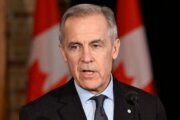ALI KOTARUMALOS
JAKARTA, Indonesia (AP) — Rebooting a slowing economy in a nation of 250 million where inequality is rising, a looming decision on raising fuel prices and vulnerability to any U.S. interest rate hikes would be enough to tax any incoming president.
But Indonesia’s Joko “Jokowi” Widodo, who takes office Monday, must also find a way to work with a powerful and well-funded opposition that could block moves to address the challenges holding back the country’s rise as an emerging market powerhouse.
At least eight heads of state and U.S. Secretary of State John Kerry will attend the inauguration, a sign of Indonesia’s regional and international clout. After years of dictatorship, the country was convulsed by unrest in the late 1990s and turned to democracy amid the upheaval of the Asian financial crisis. It is the biggest economy in Southeast Asia and home to more Muslims than any other nation.
In a positive sign for the minority government that Jokowi will lead, the head of the opposition and losing presidential candidate Prabowo Subianto met with him Friday for the first time since the polls, finally conceding defeat and offering qualified support. Many analysts still fear that Subianto could play an obstructive role, but the meeting offered at least some hope that the rancor of the bitterly contested polls might be subsiding.
Jokowi is taking over from Susilo Bambang Yudhoyono, who has overseen consolidation of Indonesia’s young democracy and steady economic growth, albeit now at just over 5 percent, its slowest pace in five years. Slowing demand in China for Indonesia’s natural resources has dulled exports. High interest rates to rein in a yawning current account deficit have also taken the steam out of the economy.
The deficit makes Indonesia highly vulnerable to the hikes expected next year in what are record-low U.S. interest rates, which could suck funds from the country, pressurizing the rupiah and spooking the markets. Jokowi will also have to quickly take steps to fix the country’s massive infrastructure problems and tackle corruption, both of which hurt efforts to attract the foreign investment needed to create jobs.
The first major test of his reform credentials will be one of the hardest: how much to cut subsidies on fuel that unless trimmed will cost the government more than $30 billion this year. The subsidies keep fuel cheap, but drain government funds that could be spent more productively on building bridges, schools or hospitals, for example.
Cutting subsidies means prices rise at the pump. That leads to follow-on hikes to the cost of basic goods and bus fares that hit the poor directly and will stoke anger at the super wealthy minority who have benefited most from Indonesia’s growth as well as Jokowi. But economists, political commentators and investors all say he has no choice if he wants to show economic responsibility and free up funds.
“There are many unpopular policies, including raising fuel prices, that have to be taken, although that may lead to anger and resistance from the opposition coalition in the first year,” said Sofyan Wanandi, a high-profile businessman and chairman of the Indonesian Employers Association. “But there is no pleasant-tasting medicine to fix the economy. If we don’t take it, our economy will be destroyed.”
Jokowi doesn’t need parliamentary approval to cut the subsidies, but he is likely to be criticized by the opposition and sections of the media. Previous hikes in fuel prices have led to street demonstrations and riots, and were a factor in the downfall of former dictator Suharto.
Jokowi, a former furniture seller, won 54 percent of the votes in the July elections after a grassroots campaign that stressed his ordinariness, honesty and record of hard work and uncorrupt service as Jakarta governor. He is the seventh Indonesian president, and the only one that hasn’t been drawn from the country’s political, economic and military elite.
After the inauguration, Jakarta is planning a street celebration and live music concert at which it is rumored Jokowi, who is a guitarist and heavy metal fan, will play.
Subianto, who has been trying to become president for more than 10 years, has a poor human rights record and close ties to the elite that governed the country during the Suharto years. Many democracy activists have expressed fears that he would go to any lengths, including undemocratic ones, to secure the presidency.
His refusal to concede defeat and unsuccessful legal campaign to get the vote overturned had only added to those concerns.
Last month, legislators loyal to Subianto voted to scrap direct elections for local officials, triggering anger at what many regarded as a grave setback to democracy that would return power to the mostly corrupt political parties. Jokowi rose to national prominence after being directly elected a regional governor.
The meeting Friday served to allay those concerns, though much remains uncertain.
It took place at the house of Subianto’s father in southern Jakarta.
“I told him that I will ask my friends and supporters to support him and the government he will lead,” Subianto said. “If there are things that we feel unprofitable, we will not hesitate to express criticism.”
Jokowi has yet to name his Cabinet. He could offer places to opposition members, broadening his support.
Economic professor Fransiskus Xaverius Sugiyanto said he thought it likely that the government could function even with such a large opposition, though its members would try and block legislation that was harmful to their business interests.
“As long as the government’s policies and strategies are really based on the people’s needs and interests, I am sure he will survive for the next five years,” he said.
Copyright 2014 The Associated Press. All rights reserved. This material may not be published, broadcast, rewritten or redistributed.







